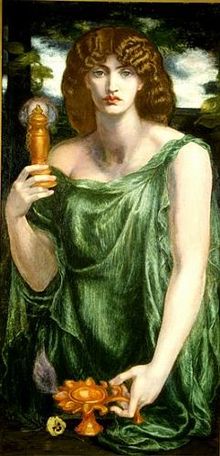- Mnemosyne
-
Greek deities
seriesTitans The Twelve Titans:
Oceanus and Tethys,
Hyperion and Theia,
Coeus and Phoebe,
Cronus and Rhea,
Mnemosyne, Themis,
Crius, Iapetus
Children of Oceanus:
Oceanids, Potamoi
Children of Hyperion:
Eos, Helios, Selene
Daughters of Coeus:
Leto and Asteria
Sons of Iapetus:
Atlas, Prometheus,
Epimetheus, Menoetius
Sons of Crius:
Astraeus, Pallas,
PersesMnemosyne (
 /nɨˈmɒzɨniː/ or /nɨˈmɒsɨni/; Greek: Mνημοσύνη, pronounced [mnɛːmosýːnɛː]), source of the word mnemonic,[2] was the personification of memory in Greek mythology. This titaness was the daughter of Gaia and Uranus and the mother of the nine Muses by Zeus:
/nɨˈmɒzɨniː/ or /nɨˈmɒsɨni/; Greek: Mνημοσύνη, pronounced [mnɛːmosýːnɛː]), source of the word mnemonic,[2] was the personification of memory in Greek mythology. This titaness was the daughter of Gaia and Uranus and the mother of the nine Muses by Zeus:- Calliope (Epic Poetry)
- Clio (History)
- Erato (Love Poetry)
- Euterpe (Music)
- Melpomene (Tragedy)
- Polyhymnia (Hymns)
- Terpsichore (Dance)
- Thalia (Comedy)
- Urania (Astronomy)
In Hesiod's Theogony, kings and poets receive their powers of authoritative speech from their possession of Mnemosyne and their special relationship with the Muses.
Zeus and Mnemosyne slept together for nine consecutive nights and thereby created the nine Muses. Mnemosyne also presided over a pool[3] in Hades, counterpart to the river Lethe, according to a series of 4th century BC Greek funerary inscriptions in dactylic hexameter. Dead souls drank from Lethe so they would not remember their past lives when reincarnated. Initiates were encouraged to drink from the river Mnemosyne when they died, instead of Lethe. These inscriptions may have been connected with Orphic poetry (see Zuntz, 1971).
Similarly, those who wished to consult the oracle of Trophonius in Boeotia were made to drink alternately from two springs called "Lethe" and "Mnemosyne". An analogous setup is described in the Myth of Er at the end of Plato's Republic.
References
- Zuntz, Günther. Persephone. Cambridge, 1971.
Notes
- ^ Collection of the Delaware Art Museum, Samuel and Mary R. Bancroft Memorial, Rossetti Archive.
- ^ Memory and the name Memnon, as in "Memnon of Rhodes" are etymologically related. Mnemosyne is sometimes confused with Mneme or compared with Memoria.
- ^ Richard Janko, “Forgetfulness in the Golden Tablets of Memory,” Classical Quarterly 34 (1984) 89–100; see article "Totenpass" for the reconstructed devotional which instructs the initiated soul through the landscape of Hades, including the pool of Memory.
See also
Greek mythology (deities) Primordial
deitiesMoirai (Fates)Titan
deitiesTitanesTitanidesHyperionidesKoionidesKrionidesIapetionidesOlympian
deitiesDodekatheonTheoi OlympioiMousai (Muses)Charites (Graces)- Aglaea
- Euphrosyne
- Thalia
Horae (Hours)StyktidesOceanic
deitiesTheoi HalioiChthonic
deitiesTheoi KhthonioiErinyes (Furies)Earthborn- Hecatonchires
- Cyclopes
- Gigantes
- Kouretes
- Meliae
- Telkhines
- Typhon
Apotheothenai- Iacchus
- Trophonius
- Triptolemus
- Orpheus
- Minos
- Aeacus
- Rhadamanthys
Greek religion and mythology Religions and cults Groups Twelve Olympians Other major deities Heroes Rites and practices - Amphidromia
- Hymns
- Iatromantis
- Pharmakos
- Prayers
- Sacrifices
- Temples
- Votive offerings
Sacred places Categories:- Greek goddesses
- Greek mythology
- Titans
- Rivers of Hades
- Offspring of Gaia
- Divine women of Zeus
- Memory
- Personification in Greek mythology
Wikimedia Foundation. 2010.

